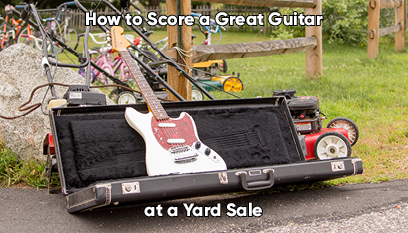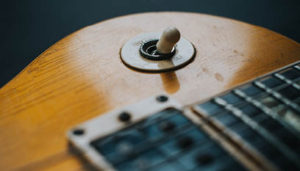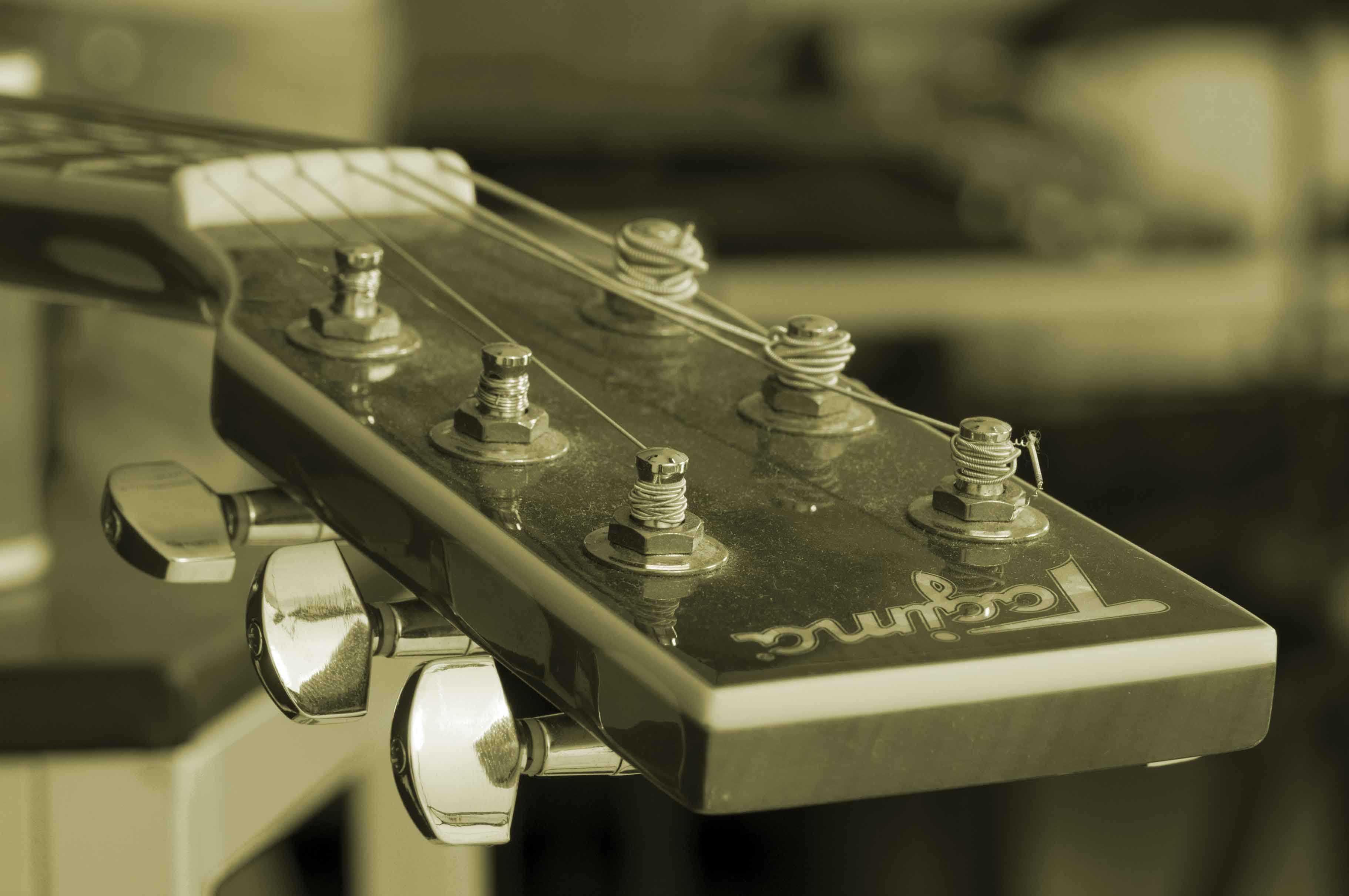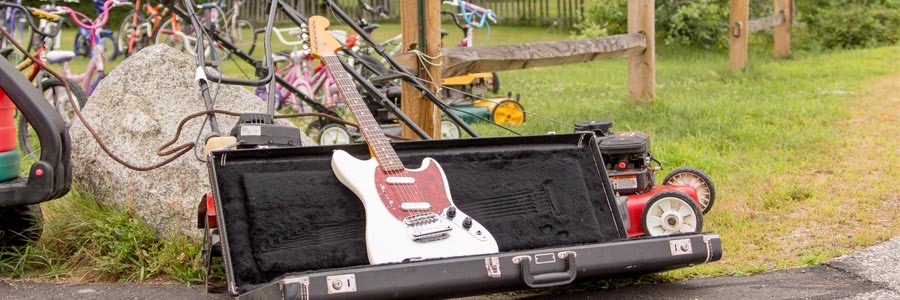
I’m writing this post at the start of summer, which is also the start of yard sale season. It’s always fun to cruise the sales looking for a sweet secondhand guitar, and while I have yet to score a dream guitar at a yard sale, I have never given up the dream and to this day I always scan for guitars when I pass by a yard sale.
Can you really buy a decent guitar at a yard sale? Sure. A yard-sale guitar can be a great purchase if it’s well-made, well cared for, and comfortable to play. But there are a few things you need to know in order to steer clear of money pits, and keep your expectations realistic. Unfortunately, in the Internet Age you’re not going to discover a pristine ’57 Les Paul or a Civil War era Martin in somebody’s garage, although it would be amazing if you did!
How to Assess a Used Guitar at a Yard Sale or an Estate Sale
Let’s say you’ve found a guitar that interests you at a sale. The seller may know very little about the guitar besides what they were able to glean from the internet, and that might not be accurate. Here are a few questions you should ask if you find an instrument you’re interested in.
- What can you tell me about the guitar? (You might hear a cool story.)
- Do you know when it was purchased?
- Where (and how) was it stored, and for how long?
- When is the last time someone played it?
Is it well-made?
How do you know if a guitar was well-made? Quality should be apparent in the materials and craftsmanship. If the tuning pegs or knobs are cheap and hard to operate, that’s a sign of poor craftsmanship.
Some vintage guitars are made with old-growth wood, like Brazilian rosewood, and would be impossible to build today which is another reason to shop for used instruments.
If you’re interested in learning more about the properties of different tonewoods and how to identify them, you should check out my post on tonewoods which includes a few helpful charts.
Quality acoustic guitars are made out of a hardwood like maple, spruce, or mahogany. Cheaper models use laminated woods (i.e., plywood) for the back and sides, which makes their tone less desirable. Cheaper models also use lower quality finishes and hardware, although it’s not a given that all the hardware on a used guitar is original. Previous owners may have made some changes along the way. Some changes like upgraded tuners add value to the instrument.
Is it in good shape?
Buying a used guitar in person rather than online makes it much easier to spot red flags. To assess the condition of a random used guitar, get your hands on it. Look at it from all angles, and play every fret.
- Is the neck straight, without any high or low spots or any twisting?
- If you see cracks, are they deep or just cosmetic?
- Is there rust anywhere?
- Are the frets sharp and scratchy?
- If it is an acoustic or a hollow body, is the bridge firmly attached or has it started to lift? Is there any warping of the top, sides, back or joints?
- If it’s an electric, do you hear any odd sounds (buzzing, clicking, crackling, popping, etc.) when you plug it in and play it? Is the sound consistent, or does it cut in and out?
Don’t worry about superficial scratches or easy fixes, like old strings. You’re going to want a set-up anyway.
Overall, your observations should back up whatever information the seller shared. A guitar that sat in an attic for 30 years will look very different from a guitar that somebody’s son thrashed around in high school garage bands.
Ideally, you would have a good sense of the fair market value of the guitar and the cost of any repairs you’re planning to have done. If the guitar needs some work, that’s OK – as long as that particular guitar is worth the investment. A quality instrument that needs about $100 in work is fine (if your budget allows it) but a Costco knock-off that needs new frets, for example, should be a hard pass.
Does it stay in tune?
Cheap guitars have cheap tuners that don’t work very well. Also, cheap guitars (or old ones) have exposed gears in the tuning machines that can get dirty which makes them hard to operate. So tune the guitar, if it’s not tuned already. A clip-on tuner is perfect for this!
Play it for five minutes to see if anything goes out of tune. A drizzly flea market (for example) is not the best location for playing guitar, so weather conditions where you are may explain any tuning issues. If it goes out of tune, tune it again and play for five more minutes. If it keeps slipping out of tune, move on.
Is it a good deal?
Always assume the price is negotiable. Haggling is expected, so don’t be afraid to counter-offer – especially if the sale is almost over. Of course, if you wait too long the guitar will be gone. Remember, scoring a true bargain at a yard sale or an estate sale requires some luck, but it can be done.
Even if the seller tells you where and when the guitar was made, look up the serial number to confirm.(This is pretty easy to do. A quick Google Search for the brand plus serial number lookup will get you pointed in the right direction). American-made guitars are generally worth more than Mexican or Asian versions of the same brand. If you find an American-made Fender or Gibson, it’s in good condition, and the asking price isn’t crazy, BUY IT. I’m not saying there’s anything wrong with a MiM (Made in Mexico) Strat. Many of them sound great and might be the perfect guitar for you! Just be aware of the difference in the market value so you don’t overpay.
Watch out for alterations that lower the value. Quality guitars are usually worth more if they haven’t been refinished. Unless you are looking for a beater guitar to knock around your dorm room, avoid any guitar that somebody bedazzled with stickers or tried to paint themselves. A headstock that was broken and repaired can also lower the guitar’s value unless the repair was done by a reputable luthier. This is a particularly common issue with Gibsons.
A case is not a deal-breaker either way, but the inclusion of a case can turn a good deal into a great one. If the guitar itself is junk and they’re only asking $20, it might be worth getting just for the case! It’s like buying an ugly piece of wall art with a nice frame you can re-purpose. The fact that the case even exists is a positive sign — it suggests the instrument was protected to some extent.
Do you actually like playing it?
Assuming you are buying this guitar to play yourself and not to resell, make sure you like how it feels and sounds. A guitar that is comfortable for my best friend Pat (6’5”) might feel awful for me (5’7”) and that’s OK. Also consider your preferences in body style, pick-ups, etc. Don’t buy a guitar you’ll hate playing just because the price is right.
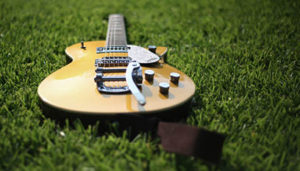
General Bargain-Hunting Tips
Be prepared. Bring cash, a phone, a guitar-nerd friend, and an amp.
You’ll be hard-pressed to find a seller at a yard sale or a flea market willing to take a personal check from a stranger, so be sure to bring cash on your treasure-hunting mission. Carrying only $20s from the ATM could limit your negotiating options, though, so try to have some smaller bills in case the seller doesn’t have appropriate change.
Use your smartphone to look up basic information about the guitar, as well as the serial number. You can also check eBay to get a sense of the guitar’s current value. One big caveat to remember with eBay: the price you see is just the asking price. There’s no guarantee anyone is willing to pay that much. I could go on eBay right now and list my left shoe for $5,000 – that doesn’t mean anything. Also, you need to be as precise as possible when looking up gear on these sites. What seems like a minor detail, like the exact year the guitar was made, could massively affect the value.
Beginners who don’t know much about guitars would be wise to bring a more knowledgeable friend along to keep them from getting ripped off. I’m not saying people at yard sales are intentionally trying to scam shoppers – they may just have a wildly inaccurate idea of the market. Just as you are hoping to find a diamond in the rough, they may be hoping that that old guitar of Granddad’s is a priceless antique. You should also be prepared to educate the seller on what you’ll have to invest in the instrument in terms of work to make it playable.
If you’re looking for electric guitars, bring a practice amp with you to test it out. Those planning to do a lot of bargain-hunting may even consider getting a cheap battery-powered amp for testing electronics. Buying a used guitar you’ve never played is a gamble, unless the guitar is so cheap that you don’t mind replacing a few things. Should you find yourself looking at a used guitar without an amp, you could use that fact to try to negotiate a lower price.
Keep your eye out for estate sales
Companies that do estate sales and liquidations typically have websites and Facebook pages where they post specific items that will be included in the sale. You can follow these pages and watch for guitars to come up for sale. You can do the same thing with Facebook yard sale pages.
If the person who passed away was a serious musician or had a home studio full of gear, don’t get your hopes up—the place will be crawling with dealers and prices will be competitive. You want an estate sale with a couple of cool guitars, but not enough to attract the professionals.
Why I’m not recommending antique stores
In my experience, antique stores aren’t worth it. Antique dealers often know a ton about furniture, but instruments are usually not their area of expertise. I’ve seen SO many garbage guitars at antique stores, and they’re always priced at $100-125. These are guitars I wouldn’t pay $10 for! But who knows? Maybe you’ll luck out and find a treasure at one of these places.
Happy hunting!

